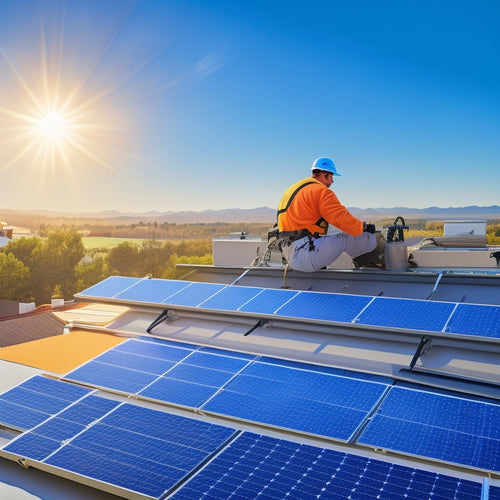Arming the Future: Solar Energy in Military Commemoratives
Share
As you explore the military's energy consumption challenges, you'll find that solar energy is transforming modern warfare. Silent energy operations, enhanced battlefield mobility, and reduced fuel convoys are just a few advantages of solar power. By integrating solar energy, military bases can reduce fuel consumption, improve operational efficiency, and minimize environmental impact. Energy independence in combat zones is critical, and solar energy is key to achieving it. As you move forward, you'll discover the critical role solar energy plays in arming the future of military operations, and how it's shaping the future of warfare.
Key Takeaways
• Solar energy enables silent operations, reducing the risk of detection and enhancing battlefield mobility in military operations.
• Integrating solar power reduces fuel consumption, decreasing the logistical burden and enhancing energy independence in combat zones.
• Solar energy provides a reliable source of power, ensuring critical operations remain online during grid failures or fuel supply disruptions.
• Renewable energy technologies are transforming the modern battlefield, making sustainable power sources a decisive factor in military operations.
• Energy security is enhanced through solar energy, reducing reliance on fossil fuels and mitigating logistical vulnerabilities in military operations.
Military's Energy Consumption Challenges
The military's massive energy appetite, driven by its extensive global presence and complex logistical networks, poses significant energy consumption challenges.
As you consider the military's energy needs, you'll realize that fuel logistics play a critical role in sustaining operations. The sheer volume of fuel required to power vehicles, generators, and equipment is staggering.
This, in turn, puts a strain on energy security, making it essential to identify innovative solutions to reduce energy dependence.
You'll appreciate the complexity of fuel logistics in modern warfare. The military relies on extensive supply chains, which can be vulnerable to disruptions, sabotage, or even cyberattacks.
This vulnerability compromises energy security, jeopardizing the success of military operations. Additionally, fuel transportation and storage pose significant risks, including accidents, spills, and environmental damage.
It's clear that the military's energy consumption challenges are multifaceted and demand a thorough approach to achieve energy security and sustainability. As you explore the world of military energy consumption, you'll discover the urgent need for innovative solutions to address these challenges.
Solar Energy Advantages in Warfare
As you explore the benefits of solar energy in warfare, you'll find that it offers two significant advantages.
Specifically, solar energy enables silent energy operations, allowing troops to operate undetected in the field.
Additionally, solar power enhances battlefield mobility by reducing the need for fuel resupply convoys, freeing up resources for more critical mission objectives.
Silent Energy Operations
You can substantially reduce your operational footprint by leveraging solar energy to power military equipment and communication systems, thereby minimizing the risk of detection in covert operations.
This is particularly vital in special operations where stealth is paramount. By harnessing the power of the sun, you can maintain a low profile, reducing the noise and heat signatures associated with traditional fossil-fuel-based power sources.
This enables you to operate undetected, extending the duration of your mission without compromising your position.
Solar energy provides the perfect solution for 'Stealth Power,' allowing you to power your equipment without betraying your location.
This 'Energy Camouflage' enables you to blend seamlessly into your surroundings, reducing the risk of detection.
With solar power, you can operate in complete silence, without the hum of generators or the rumble of diesel engines.
This capability is critical in today's modern battlefield, where surveillance and detection systems are increasingly sophisticated.
Enhanced Battlefield Mobility
Solar-powered equipment substantially reduces logistical burdens, allowing forces to rapidly redeploy and reposition without being tethered to fuel supply lines.
This increased flexibility enables you to establish a Mobile Command center in remote areas, providing real-time situational awareness and facilitating swift decision-making.
With solar energy, you can maintain a high tempo of operations, unhindered by the need for fuel resupply.
Rapid Deployment becomes a reality, as solar-powered equipment enables you to quickly set up and tear down operations, always staying one step ahead of the enemy.
In addition, solar energy reduces the risk of fuel convoys being ambushed, minimizing the threat to personnel and equipment.
You can focus on the mission at hand, knowing that your energy needs are met without compromising operational security.
As you move through the battlespace, solar energy guarantees that your equipment remains powered, enabling you to stay connected and coordinated with your team.
Enhancing Operational Efficiency
As you explore the role of solar energy in enhancing operational efficiency, you'll find that it can substantially impact your military operations.
By powering forward bases with solar energy, you can reduce your reliance on fuel convoys, which are often vulnerable to attacks.
Additionally, solar power can decrease the overall fuel burden, allowing you to allocate resources more efficiently.
Powering Forward Bases
As you operate in remote areas, powering forward bases efficiently is vital. Forward-operating bases, which rely on diesel generators for power, can reduce their fuel consumption by up to 30% by integrating solar energy systems, thereby enhancing operational efficiency.
By doing so, you can improve your remote security posture while minimizing your reliance on fuel convoys. This, in turn, reduces the risk of attacks and frees up resources for more critical tasks.
Here's a comparison of traditional vs. solar-powered forward bases:
| Parameter | Traditional Base | Solar-Powered Base | Benefits |
|---|---|---|---|
| Fuel Consumption | High | Low | Reduced fuel burden |
| Security Risk | High | Low | Decreased risk of attacks |
| Operational Efficiency | Low | High | Enhanced efficiency |
Reducing Fuel Burden
By integrating solar energy systems into forward-operating bases, you can substantially reduce fuel burden, freeing up resources and enabling a more efficient allocation of personnel and equipment.
This, in turn, enhances operational efficiency, allowing you to focus on critical mission objectives.
Reducing fuel burden also improves fuel logistics, decreasing the need for frequent resupply convoys that can put personnel and equipment at risk.
With solar energy, you can reduce fuel consumption by up to 60%.
Decrease the number of fuel convoys by up to 40%.
Increase energy resilience by providing a reliable source of power.
Reducing Carbon Footprint Strategies
Implementing renewable energy sources, such as solar power, is essential for reducing the military's carbon footprint, as it enables a significant decrease in greenhouse gas emissions from fossil fuel-based power generation. You can play a key role in this shift by adopting sustainable infrastructure and carbon offset strategies.
| Strategy | Benefits |
|---|---|
| Renewable Energy Certificates (RECs) | Supports large-scale renewable energy projects, reducing greenhouse gas emissions |
| Carbon Offset Programs | Compensates for emissions by investing in renewable energy projects or reforestation |
| Energy Efficiency Upgrades | Reduces energy consumption, lowering emissions and costs |
| Green Building Initiatives | Incorporates sustainable design and materials, minimizing environmental impact |
| Net Zero Energy Installations | Produces as much energy as consumed, achieving net zero emissions |
Energy Independence in Combat
You can substantially enhance energy independence in combat zones by leveraging advanced solar energy technologies that reduce reliance on fossil fuels and mitigate logistical vulnerabilities.
This shift towards solar energy can notably boost combat readiness by reducing the risk of fuel supply disruptions, which can be a pivotal factor in the success of military operations.
By integrating solar energy into their operations, military forces can:
Enhance energy security by reducing dependence on fossil fuels, which can be vulnerable to disruptions in supply chains.
Improve combat readiness by ensuring a reliable source of energy, even in remote or hostile environments.
Reduce the logistical burden of fuel transportation, allowing for more efficient allocation of resources.
Integrating Solar Into Military Bases
As military bases increasingly rely on solar energy to power their operations, integrating solar panels into existing infrastructure becomes a critical step towards achieving energy independence and reducing reliance on fossil fuels.
You're likely wondering how to seamlessly integrate solar energy into your base's infrastructure. The key is to identify areas with high energy demands, such as data centers, communication hubs, and security systems.
By prioritizing these areas, you can guarantee that your base's critical operations remain online, even in the event of a grid failure. This not only enhances Base Security but also provides a reliable source of power.
To maximize energy generation, consider pairing solar panels with Energy Storage systems, allowing you to store excess energy for later use. This hybrid approach enables you to optimize energy production and reduce your reliance on diesel generators.
Future of Renewable Energy Warfare
Renewable energy technologies are transforming the modern battlefield, where the ability to harness and deploy sustainable power sources is becoming a decisive factor in military operations. As you step into the future of renewable energy warfare, you'll realize that energy security is no longer just about fueling tanks and aircraft. It's about powering the entire military infrastructure, from bases to command centers.
Cyber vulnerabilities: As renewable energy systems become more interconnected, they introduce new risks of cyber attacks that can cripple military operations.
Energy diplomacy: The pursuit of renewable energy can become a tool for diplomacy, as nations collaborate on energy security and share best practices.
Operational flexibility: Renewable energy enables military units to operate independently, without reliance on fossil fuels, and enhances their ability to respond quickly to emerging threats.
In this new landscape, the ability to harness and manage renewable energy will be a critical component of military strategy. You'll need to stay ahead of the curve, leveraging cutting-edge technologies to stay powered and connected in the face of evolving threats.
Frequently Asked Questions
Can Solar Energy Power Military Equipment in Extreme Temperatures?
You'll find that solar energy can indeed power military equipment in extreme temperatures, thanks to advanced thermal regulation and power optimization techniques, ensuring reliable performance in even the most demanding environments.
How Do Solar Panels Withstand Harsh Battlefield Conditions?
You'll find that solar panels are designed to withstand harsh battlefield conditions due to their corrosion resistance and durable materials, ensuring peak performance even in extreme environments with high temperatures and humidity.
Are Solar-Powered Drones Used for Military Surveillance?
You're likely wondering if solar-powered drones are used for military surveillance; the answer is yes, they're employed for aerial reconnaissance, leveraging drone autonomy to gather intel in remote, hard-to-reach areas, enhancing your situational awareness.
Can Solar Energy Reduce Military Dependence on Fuel Convoys?
You're likely wondering if solar energy can reduce military dependence on fuel convoys; the answer lies in overcoming logistical hurdles, ensuring energy security through fuel alternatives, and optimizing supply chain management to inform battlefield strategy.
Do Solar Panels Increase Military Base Vulnerability to Attack?
You need to bear in mind that installing solar panels on military bases can introduce new attack vectors and security risks, potentially increasing vulnerability to cyber and physical attacks if not properly secured and monitored.
Related Posts
-

Top 10 Tips for Buying Car Accessories Online
When purchasing car accessories online, you should take proactive steps to avoid low-quality or incompatible products...
-

10 Best Solar Panel Options for Motorhomes Online
When choosing the best solar panel for your motorhome, consider factors like efficiency, durability, and design. You'...
-

3 Essential Steps for Solar Electricity Installation
To guarantee a successful solar electricity installation, you'll need to follow three essential steps. First, assess ...


